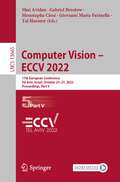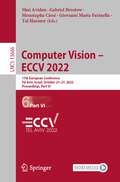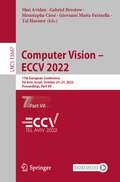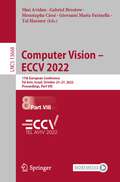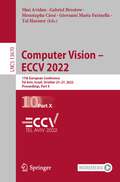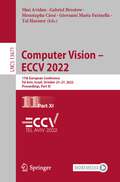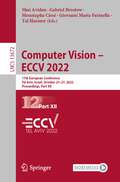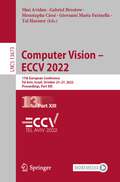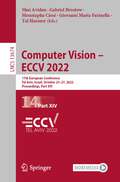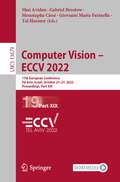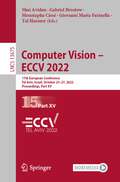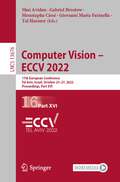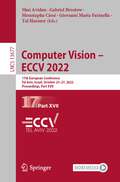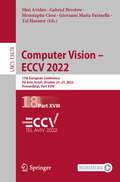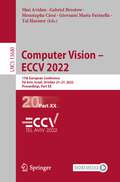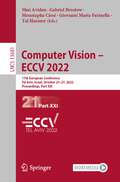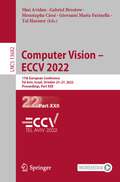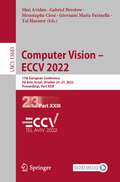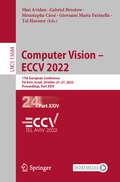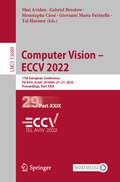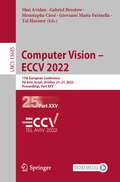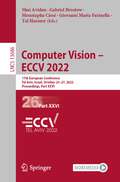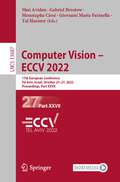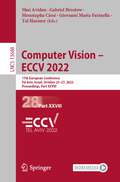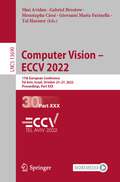- Table View
- List View
Computer Vision – ECCV 2022: 17th European Conference, Tel Aviv, Israel, October 23–27, 2022, Proceedings, Part V (Lecture Notes in Computer Science #13665)
by Giovanni Maria Farinella Tal Hassner Shai Avidan Gabriel Brostow Moustapha CisséThe 39-volume set, comprising the LNCS books 13661 until 13699, constitutes the refereed proceedings of the 17th European Conference on Computer Vision, ECCV 2022, held in Tel Aviv, Israel, during October 23–27, 2022. The 1645 papers presented in these proceedings were carefully reviewed and selected from a total of 5804 submissions. The papers deal with topics such as computer vision; machine learning; deep neural networks; reinforcement learning; object recognition; image classification; image processing; object detection; semantic segmentation; human pose estimation; 3d reconstruction; stereo vision; computational photography; neural networks; image coding; image reconstruction; object recognition; motion estimation.
Computer Vision – ECCV 2022: 17th European Conference, Tel Aviv, Israel, October 23–27, 2022, Proceedings, Part VI (Lecture Notes in Computer Science #13666)
by Giovanni Maria Farinella Tal Hassner Shai Avidan Gabriel Brostow Moustapha CisséThe 39-volume set, comprising the LNCS books 13661 until 13699, constitutes the refereed proceedings of the 17th European Conference on Computer Vision, ECCV 2022, held in Tel Aviv, Israel, during October 23–27, 2022. The 1645 papers presented in these proceedings were carefully reviewed and selected from a total of 5804 submissions. The papers deal with topics such as computer vision; machine learning; deep neural networks; reinforcement learning; object recognition; image classification; image processing; object detection; semantic segmentation; human pose estimation; 3d reconstruction; stereo vision; computational photography; neural networks; image coding; image reconstruction; object recognition; motion estimation.
Computer Vision – ECCV 2022: 17th European Conference, Tel Aviv, Israel, October 23–27, 2022, Proceedings, Part VII (Lecture Notes in Computer Science #13667)
by Giovanni Maria Farinella Tal Hassner Shai Avidan Gabriel Brostow Moustapha CisséThe 39-volume set, comprising the LNCS books 13661 until 13699, constitutes the refereed proceedings of the 17th European Conference on Computer Vision, ECCV 2022, held in Tel Aviv, Israel, during October 23–27, 2022. The 1645 papers presented in these proceedings were carefully reviewed and selected from a total of 5804 submissions. The papers deal with topics such as computer vision; machine learning; deep neural networks; reinforcement learning; object recognition; image classification; image processing; object detection; semantic segmentation; human pose estimation; 3d reconstruction; stereo vision; computational photography; neural networks; image coding; image reconstruction; object recognition; motion estimation.
Computer Vision – ECCV 2022: 17th European Conference, Tel Aviv, Israel, October 23–27, 2022, Proceedings, Part VIII (Lecture Notes in Computer Science #13668)
by Giovanni Maria Farinella Tal Hassner Shai Avidan Gabriel Brostow Moustapha CisséThe 39-volume set, comprising the LNCS books 13661 until 13699, constitutes the refereed proceedings of the 17th European Conference on Computer Vision, ECCV 2022, held in Tel Aviv, Israel, during October 23–27, 2022. The 1645 papers presented in these proceedings were carefully reviewed and selected from a total of 5804 submissions. The papers deal with topics such as computer vision; machine learning; deep neural networks; reinforcement learning; object recognition; image classification; image processing; object detection; semantic segmentation; human pose estimation; 3d reconstruction; stereo vision; computational photography; neural networks; image coding; image reconstruction; object recognition; motion estimation.
Computer Vision – ECCV 2022: 17th European Conference, Tel Aviv, Israel, October 23–27, 2022, Proceedings, Part X (Lecture Notes in Computer Science #13670)
by Giovanni Maria Farinella Tal Hassner Shai Avidan Gabriel Brostow Moustapha CisséThe 39-volume set, comprising the LNCS books 13661 until 13699, constitutes the refereed proceedings of the 17th European Conference on Computer Vision, ECCV 2022, held in Tel Aviv, Israel, during October 23–27, 2022. The 1645 papers presented in these proceedings were carefully reviewed and selected from a total of 5804 submissions. The papers deal with topics such as computer vision; machine learning; deep neural networks; reinforcement learning; object recognition; image classification; image processing; object detection; semantic segmentation; human pose estimation; 3d reconstruction; stereo vision; computational photography; neural networks; image coding; image reconstruction; object recognition; motion estimation.
Computer Vision – ECCV 2022: 17th European Conference, Tel Aviv, Israel, October 23–27, 2022, Proceedings, Part XI (Lecture Notes in Computer Science #13671)
by Giovanni Maria Farinella Tal Hassner Shai Avidan Gabriel Brostow Moustapha CisséThe 39-volume set, comprising the LNCS books 13661 until 13699, constitutes the refereed proceedings of the 17th European Conference on Computer Vision, ECCV 2022, held in Tel Aviv, Israel, during October 23–27, 2022. The 1645 papers presented in these proceedings were carefully reviewed and selected from a total of 5804 submissions. The papers deal with topics such as computer vision; machine learning; deep neural networks; reinforcement learning; object recognition; image classification; image processing; object detection; semantic segmentation; human pose estimation; 3d reconstruction; stereo vision; computational photography; neural networks; image coding; image reconstruction; object recognition; motion estimation.
Computer Vision – ECCV 2022: 17th European Conference, Tel Aviv, Israel, October 23–27, 2022, Proceedings, Part XII (Lecture Notes in Computer Science #13672)
by Giovanni Maria Farinella Tal Hassner Shai Avidan Gabriel Brostow Moustapha CisséThe 39-volume set, comprising the LNCS books 13661 until 13699, constitutes the refereed proceedings of the 17th European Conference on Computer Vision, ECCV 2022, held in Tel Aviv, Israel, during October 23–27, 2022. The 1645 papers presented in these proceedings were carefully reviewed and selected from a total of 5804 submissions. The papers deal with topics such as computer vision; machine learning; deep neural networks; reinforcement learning; object recognition; image classification; image processing; object detection; semantic segmentation; human pose estimation; 3d reconstruction; stereo vision; computational photography; neural networks; image coding; image reconstruction; object recognition; motion estimation.
Computer Vision – ECCV 2022: 17th European Conference, Tel Aviv, Israel, October 23–27, 2022, Proceedings, Part XIII (Lecture Notes in Computer Science #13673)
by Giovanni Maria Farinella Tal Hassner Shai Avidan Gabriel Brostow Moustapha CisséThe 39-volume set, comprising the LNCS books 13661 until 13699, constitutes the refereed proceedings of the 17th European Conference on Computer Vision, ECCV 2022, held in Tel Aviv, Israel, during October 23–27, 2022. The 1645 papers presented in these proceedings were carefully reviewed and selected from a total of 5804 submissions. The papers deal with topics such as computer vision; machine learning; deep neural networks; reinforcement learning; object recognition; image classification; image processing; object detection; semantic segmentation; human pose estimation; 3d reconstruction; stereo vision; computational photography; neural networks; image coding; image reconstruction; object recognition; motion estimation.
Computer Vision – ECCV 2022: 17th European Conference, Tel Aviv, Israel, October 23–27, 2022, Proceedings, Part XIV (Lecture Notes in Computer Science #13674)
by Giovanni Maria Farinella Tal Hassner Shai Avidan Gabriel Brostow Moustapha CisséThe 39-volume set, comprising the LNCS books 13661 until 13699, constitutes the refereed proceedings of the 17th European Conference on Computer Vision, ECCV 2022, held in Tel Aviv, Israel, during October 23–27, 2022. The 1645 papers presented in these proceedings were carefully reviewed and selected from a total of 5804 submissions. The papers deal with topics such as computer vision; machine learning; deep neural networks; reinforcement learning; object recognition; image classification; image processing; object detection; semantic segmentation; human pose estimation; 3d reconstruction; stereo vision; computational photography; neural networks; image coding; image reconstruction; object recognition; motion estimation.
Computer Vision – ECCV 2022: 17th European Conference, Tel Aviv, Israel, October 23–27, 2022, Proceedings, Part XIX (Lecture Notes in Computer Science #13679)
by Giovanni Maria Farinella Tal Hassner Shai Avidan Gabriel Brostow Moustapha CisséThe 39-volume set, comprising the LNCS books 13661 until 13699, constitutes the refereed proceedings of the 17th European Conference on Computer Vision, ECCV 2022, held in Tel Aviv, Israel, during October 23–27, 2022. The 1645 papers presented in these proceedings were carefully reviewed and selected from a total of 5804 submissions. The papers deal with topics such as computer vision; machine learning; deep neural networks; reinforcement learning; object recognition; image classification; image processing; object detection; semantic segmentation; human pose estimation; 3d reconstruction; stereo vision; computational photography; neural networks; image coding; image reconstruction; object recognition; motion estimation.
Computer Vision – ECCV 2022: 17th European Conference, Tel Aviv, Israel, October 23–27, 2022, Proceedings, Part XV (Lecture Notes in Computer Science #13675)
by Giovanni Maria Farinella Tal Hassner Shai Avidan Gabriel Brostow Moustapha CisséThe 39-volume set, comprising the LNCS books 13661 until 13699, constitutes the refereed proceedings of the 17th European Conference on Computer Vision, ECCV 2022, held in Tel Aviv, Israel, during October 23–27, 2022. The 1645 papers presented in these proceedings were carefully reviewed and selected from a total of 5804 submissions. The papers deal with topics such as computer vision; machine learning; deep neural networks; reinforcement learning; object recognition; image classification; image processing; object detection; semantic segmentation; human pose estimation; 3d reconstruction; stereo vision; computational photography; neural networks; image coding; image reconstruction; object recognition; motion estimation.
Computer Vision – ECCV 2022: 17th European Conference, Tel Aviv, Israel, October 23–27, 2022, Proceedings, Part XVI (Lecture Notes in Computer Science #13676)
by Giovanni Maria Farinella Tal Hassner Shai Avidan Gabriel Brostow Moustapha CisséThe 39-volume set, comprising the LNCS books 13661 until 13699, constitutes the refereed proceedings of the 17th European Conference on Computer Vision, ECCV 2022, held in Tel Aviv, Israel, during October 23–27, 2022. The 1645 papers presented in these proceedings were carefully reviewed and selected from a total of 5804 submissions. The papers deal with topics such as computer vision; machine learning; deep neural networks; reinforcement learning; object recognition; image classification; image processing; object detection; semantic segmentation; human pose estimation; 3d reconstruction; stereo vision; computational photography; neural networks; image coding; image reconstruction; object recognition; motion estimation.
Computer Vision – ECCV 2022: 17th European Conference, Tel Aviv, Israel, October 23–27, 2022, Proceedings, Part XVII (Lecture Notes in Computer Science #13677)
by Giovanni Maria Farinella Tal Hassner Shai Avidan Gabriel Brostow Moustapha CisséThe 39-volume set, comprising the LNCS books 13661 until 13699, constitutes the refereed proceedings of the 17th European Conference on Computer Vision, ECCV 2022, held in Tel Aviv, Israel, during October 23–27, 2022. The 1645 papers presented in these proceedings were carefully reviewed and selected from a total of 5804 submissions. The papers deal with topics such as computer vision; machine learning; deep neural networks; reinforcement learning; object recognition; image classification; image processing; object detection; semantic segmentation; human pose estimation; 3d reconstruction; stereo vision; computational photography; neural networks; image coding; image reconstruction; object recognition; motion estimation.
Computer Vision – ECCV 2022: 17th European Conference, Tel Aviv, Israel, October 23–27, 2022, Proceedings, Part XVIII (Lecture Notes in Computer Science #13678)
by Giovanni Maria Farinella Tal Hassner Shai Avidan Gabriel Brostow Moustapha CisséThe 39-volume set, comprising the LNCS books 13661 until 13699, constitutes the refereed proceedings of the 17th European Conference on Computer Vision, ECCV 2022, held in Tel Aviv, Israel, during October 23–27, 2022. The 1645 papers presented in these proceedings were carefully reviewed and selected from a total of 5804 submissions. The papers deal with topics such as computer vision; machine learning; deep neural networks; reinforcement learning; object recognition; image classification; image processing; object detection; semantic segmentation; human pose estimation; 3d reconstruction; stereo vision; computational photography; neural networks; image coding; image reconstruction; object recognition; motion estimation.
Computer Vision – ECCV 2022: 17th European Conference, Tel Aviv, Israel, October 23–27, 2022, Proceedings, Part XX (Lecture Notes in Computer Science #13680)
by Giovanni Maria Farinella Tal Hassner Shai Avidan Gabriel Brostow Moustapha CisséThe 39-volume set, comprising the LNCS books 13661 until 13699, constitutes the refereed proceedings of the 17th European Conference on Computer Vision, ECCV 2022, held in Tel Aviv, Israel, during October 23–27, 2022. The 1645 papers presented in these proceedings were carefully reviewed and selected from a total of 5804 submissions. The papers deal with topics such as computer vision; machine learning; deep neural networks; reinforcement learning; object recognition; image classification; image processing; object detection; semantic segmentation; human pose estimation; 3d reconstruction; stereo vision; computational photography; neural networks; image coding; image reconstruction; object recognition; motion estimation.
Computer Vision – ECCV 2022: 17th European Conference, Tel Aviv, Israel, October 23–27, 2022, Proceedings, Part XXI (Lecture Notes in Computer Science #13681)
by Giovanni Maria Farinella Tal Hassner Shai Avidan Gabriel Brostow Moustapha CisséThe 39-volume set, comprising the LNCS books 13661 until 13699, constitutes the refereed proceedings of the 17th European Conference on Computer Vision, ECCV 2022, held in Tel Aviv, Israel, during October 23–27, 2022. The 1645 papers presented in these proceedings were carefully reviewed and selected from a total of 5804 submissions. The papers deal with topics such as computer vision; machine learning; deep neural networks; reinforcement learning; object recognition; image classification; image processing; object detection; semantic segmentation; human pose estimation; 3d reconstruction; stereo vision; computational photography; neural networks; image coding; image reconstruction; object recognition; motion estimation.
Computer Vision – ECCV 2022: 17th European Conference, Tel Aviv, Israel, October 23–27, 2022, Proceedings, Part XXII (Lecture Notes in Computer Science #13682)
by Giovanni Maria Farinella Tal Hassner Shai Avidan Gabriel Brostow Moustapha CisséThe 39-volume set, comprising the LNCS books 13661 until 13699, constitutes the refereed proceedings of the 17th European Conference on Computer Vision, ECCV 2022, held in Tel Aviv, Israel, during October 23–27, 2022. The 1645 papers presented in these proceedings were carefully reviewed and selected from a total of 5804 submissions. The papers deal with topics such as computer vision; machine learning; deep neural networks; reinforcement learning; object recognition; image classification; image processing; object detection; semantic segmentation; human pose estimation; 3d reconstruction; stereo vision; computational photography; neural networks; image coding; image reconstruction; object recognition; motion estimation.
Computer Vision – ECCV 2022: 17th European Conference, Tel Aviv, Israel, October 23–27, 2022, Proceedings, Part XXIII (Lecture Notes in Computer Science #13683)
by Giovanni Maria Farinella Tal Hassner Shai Avidan Gabriel Brostow Moustapha CisséThe 39-volume set, comprising the LNCS books 13661 until 13699, constitutes the refereed proceedings of the 17th European Conference on Computer Vision, ECCV 2022, held in Tel Aviv, Israel, during October 23–27, 2022. The 1645 papers presented in these proceedings were carefully reviewed and selected from a total of 5804 submissions. The papers deal with topics such as computer vision; machine learning; deep neural networks; reinforcement learning; object recognition; image classification; image processing; object detection; semantic segmentation; human pose estimation; 3d reconstruction; stereo vision; computational photography; neural networks; image coding; image reconstruction; object recognition; motion estimation.
Computer Vision – ECCV 2022: 17th European Conference, Tel Aviv, Israel, October 23–27, 2022, Proceedings, Part XXIV (Lecture Notes in Computer Science #13684)
by Giovanni Maria Farinella Tal Hassner Shai Avidan Gabriel Brostow Moustapha CisséThe 39-volume set, comprising the LNCS books 13661 until 13699, constitutes the refereed proceedings of the 17th European Conference on Computer Vision, ECCV 2022, held in Tel Aviv, Israel, during October 23–27, 2022. The 1645 papers presented in these proceedings were carefully reviewed and selected from a total of 5804 submissions. The papers deal with topics such as computer vision; machine learning; deep neural networks; reinforcement learning; object recognition; image classification; image processing; object detection; semantic segmentation; human pose estimation; 3d reconstruction; stereo vision; computational photography; neural networks; image coding; image reconstruction; object recognition; motion estimation.
Computer Vision – ECCV 2022: 17th European Conference, Tel Aviv, Israel, October 23–27, 2022, Proceedings, Part XXIX (Lecture Notes in Computer Science #13689)
by Giovanni Maria Farinella Tal Hassner Shai Avidan Gabriel Brostow Moustapha CisséThe 39-volume set, comprising the LNCS books 13661 until 13699, constitutes the refereed proceedings of the 17th European Conference on Computer Vision, ECCV 2022, held in Tel Aviv, Israel, during October 23–27, 2022. The 1645 papers presented in these proceedings were carefully reviewed and selected from a total of 5804 submissions. The papers deal with topics such as computer vision; machine learning; deep neural networks; reinforcement learning; object recognition; image classification; image processing; object detection; semantic segmentation; human pose estimation; 3d reconstruction; stereo vision; computational photography; neural networks; image coding; image reconstruction; object recognition; motion estimation.
Computer Vision – ECCV 2022: 17th European Conference, Tel Aviv, Israel, October 23–27, 2022, Proceedings, Part XXV (Lecture Notes in Computer Science #13685)
by Giovanni Maria Farinella Tal Hassner Shai Avidan Gabriel Brostow Moustapha CisséThe 39-volume set, comprising the LNCS books 13661 until 13699, constitutes the refereed proceedings of the 17th European Conference on Computer Vision, ECCV 2022, held in Tel Aviv, Israel, during October 23–27, 2022. The 1645 papers presented in these proceedings were carefully reviewed and selected from a total of 5804 submissions. The papers deal with topics such as computer vision; machine learning; deep neural networks; reinforcement learning; object recognition; image classification; image processing; object detection; semantic segmentation; human pose estimation; 3d reconstruction; stereo vision; computational photography; neural networks; image coding; image reconstruction; object recognition; motion estimation.
Computer Vision – ECCV 2022: 17th European Conference, Tel Aviv, Israel, October 23–27, 2022, Proceedings, Part XXVI (Lecture Notes in Computer Science #13686)
by Giovanni Maria Farinella Tal Hassner Shai Avidan Gabriel Brostow Moustapha CisséThe 39-volume set, comprising the LNCS books 13661 until 13699, constitutes the refereed proceedings of the 17th European Conference on Computer Vision, ECCV 2022, held in Tel Aviv, Israel, during October 23–27, 2022. The 1645 papers presented in these proceedings were carefully reviewed and selected from a total of 5804 submissions. The papers deal with topics such as computer vision; machine learning; deep neural networks; reinforcement learning; object recognition; image classification; image processing; object detection; semantic segmentation; human pose estimation; 3d reconstruction; stereo vision; computational photography; neural networks; image coding; image reconstruction; object recognition; motion estimation.
Computer Vision – ECCV 2022: 17th European Conference, Tel Aviv, Israel, October 23–27, 2022, Proceedings, Part XXVII (Lecture Notes in Computer Science #13687)
by Giovanni Maria Farinella Tal Hassner Shai Avidan Gabriel Brostow Moustapha CisséThe 39-volume set, comprising the LNCS books 13661 until 13699, constitutes the refereed proceedings of the 17th European Conference on Computer Vision, ECCV 2022, held in Tel Aviv, Israel, during October 23–27, 2022. The 1645 papers presented in these proceedings were carefully reviewed and selected from a total of 5804 submissions. The papers deal with topics such as computer vision; machine learning; deep neural networks; reinforcement learning; object recognition; image classification; image processing; object detection; semantic segmentation; human pose estimation; 3d reconstruction; stereo vision; computational photography; neural networks; image coding; image reconstruction; object recognition; motion estimation.
Computer Vision – ECCV 2022: 17th European Conference, Tel Aviv, Israel, October 23–27, 2022, Proceedings, Part XXVIII (Lecture Notes in Computer Science #13688)
by Giovanni Maria Farinella Tal Hassner Shai Avidan Gabriel Brostow Moustapha CisséThe 39-volume set, comprising the LNCS books 13661 until 13699, constitutes the refereed proceedings of the 17th European Conference on Computer Vision, ECCV 2022, held in Tel Aviv, Israel, during October 23–27, 2022. The 1645 papers presented in these proceedings were carefully reviewed and selected from a total of 5804 submissions. The papers deal with topics such as computer vision; machine learning; deep neural networks; reinforcement learning; object recognition; image classification; image processing; object detection; semantic segmentation; human pose estimation; 3d reconstruction; stereo vision; computational photography; neural networks; image coding; image reconstruction; object recognition; motion estimation.
Computer Vision – ECCV 2022: 17th European Conference, Tel Aviv, Israel, October 23–27, 2022, Proceedings, Part XXX (Lecture Notes in Computer Science #13690)
by Giovanni Maria Farinella Tal Hassner Shai Avidan Gabriel Brostow Moustapha CisséThe 39-volume set, comprising the LNCS books 13661 until 13699, constitutes the refereed proceedings of the 17th European Conference on Computer Vision, ECCV 2022, held in Tel Aviv, Israel, during October 23–27, 2022. The 1645 papers presented in these proceedings were carefully reviewed and selected from a total of 5804 submissions. The papers deal with topics such as computer vision; machine learning; deep neural networks; reinforcement learning; object recognition; image classification; image processing; object detection; semantic segmentation; human pose estimation; 3d reconstruction; stereo vision; computational photography; neural networks; image coding; image reconstruction; object recognition; motion estimation.
